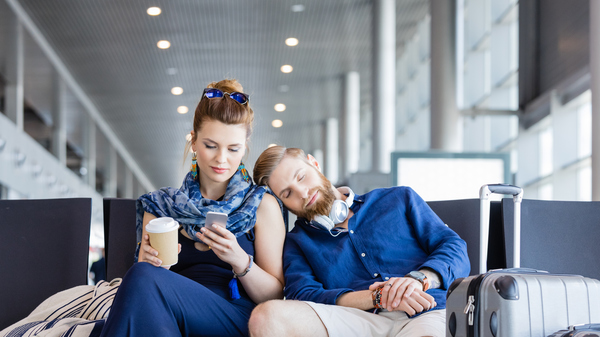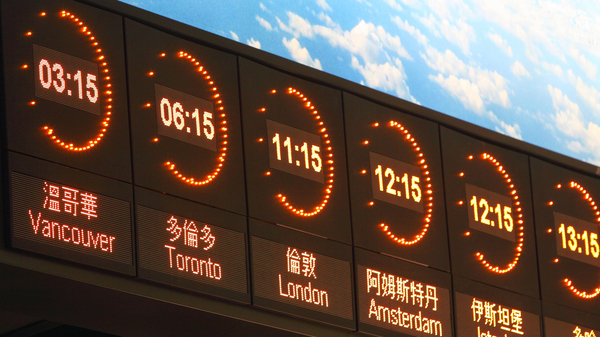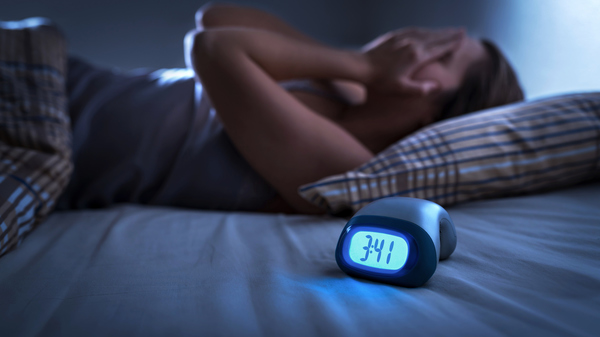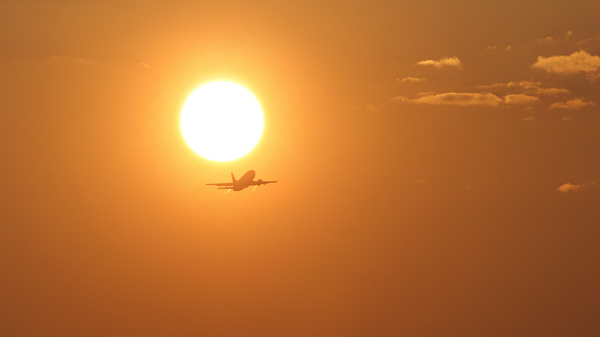Unpacking Jet Lag
If you’ve ever taken a long flight, you probably know the misery of being tired during the day and sleepless at night in your new time zone. Why does that happen?

Jet lag disturbs your circadian rhythms and can leave you feeling tired and awake at the same time.
©iStockphoto.com/izusek
A Confused Clock
Your body clock, the internal timer that regulates your body functions, relies on cues from bright light and darkness to help you wake up or go to sleep.
When you fly across a lot of time zones, there's a dramatic change in your exposure to sunlight and darkness. These new light signals can confuse your system, so the usual pattern (the circadian rhythm) that tells you when to sleep is disturbed. That's why you can arrive feeling tired and awake at the same time, one of the classic symptoms of jet lag disorder.
Distance Calculator: how far is it to your destination?

The more time meridians you cross, the more jet lag you may experience.
©iStockphoto.com/mikekwok
Fighting Jet Lag: Use the Sun
So what's the cure? How can you get your body clock to match your destination´s clock as quickly as possible?
Science doesn't have a perfect remedy for jet lag yet, but we do know that exposure to natural light is one of the keys to feeling better.
After a long flight, many of us simply want to sleep off the tiredness as soon as we get to our lodgings. But a bit of exercise and exposure to daylight are actually the most effective ways to start off your adjustment.
If you must nap, sleep experts say it's best to limit your sleep to 30 minutes. And try not to take a daytime snooze if there are less than eight hours to your projected bedtime in the new time zone.
Keep in mind that sunlight is the single biggest factor in setting your body clock, so researchers recommend exposing yourself to bright sunshine as early as possible on the first morning of your trip.
See when the Sun rises in any city

Exposure to sunlight is key to fighting jet lag.
©iStockphoto.com/Polina Panna
Take Simple Steps
Reducing jet lag doesn't have to be complicated. Sleep experts say you should take some simple, common-sense steps to make the change to a new time zone easier.
Before your trip:
- Try to get a full night's sleep before you take off.
- Some light exercise before your flight is helpful.
- Lower your stress: pack early and leave lots of time to get to the airport.
In the air:
- Drink plenty of water on the flight.
- Limit caffeine and alcohol.
- Eat light to aid digestion.
- Stand, stretch, and move when you can.
When you get there:
- Expect to experience sleepiness. Give yourself time for extra sleep and an easy schedule the first few days.
- Take a stroll or do some light exercise as soon as possible, preferably outside in the sunlight.
- Keep eating light meals.
- It's very tempting, but avoid naps longer than 30 minutes and don't indulge in them unless there are eight or more hours to your bedtime.

Adapting your sleep schedule before you travel can soften the effects of jet lag.
©iStockphoto.com/Tero Vesalainen
Resetting Your Body Clock At Home
One method some people use to soften the effects of jet lag is to change sleep schedules and meal times before the trip. The goal is to reduce the difference between one´s natural circadian clock and the local time at a destination. Of course, this technique can make meeting the demands of everyday life in your original time zone a bit challenging.
Some frequent travelers also consult with their doctors to set up a coordinated approach to supplements and light exposure designed to gear the body up for a major change in sleeping patterns.
How many time zones are there? (Probably more than you think!)
What About Melatonin?
Usually, your body produces the hormone melatonin a couple of hours before you go to sleep. When you're adapting to a new time zone, your system becomes confused and this melatonin production can get interrupted.
Some people use melatonin supplements to ease the effects of jet lag. Remember: it's always a good idea to check with your doctor about the pros and cons of any supplement or medication.
To stay in balance, your body relies on a finely-tuned interplay between melatonin, sleep cycles, and light. So what happens when that delicate mechanism gets thrown off by jet travel?
Why it’s so hard to convert time zones in your headKeeping the Rhythm
To keep your natural cycle of sleeping and waking working smoothly, a complex system of signals and triggers is at work.
It starts with cells in the back of your eyes sending light signals to the hypothalamus brain region, which in turn communicates with your pineal gland . This tiny gland in the center of your brain secretes melatonin, the hormone that is key to the process of going to sleep.
At night, the bright light signal from your eyes becomes low, which triggers the hypothalamus to tell your pineal gland to jump into action and release its melatonin, setting the sleep cycle in motion.
But on a long flight, the day and night patterns get disrupted. Now the hypothalamus gets strange new signals about light, and holds off telling the pineal gland to release its melatonin.
So the circadian rhythm that relies on this hormone to start the sleep cycle fails to start, and you struggle to go to sleep or wake up properly.
Babies and Daylight Saving Time: adjusting your baby’s sleep

Taking off into the sunrise: many people suffer worse jet lag heading east.
©iStockphoto.com/FreezingRain
Worse Going East
Broken rhythms aren´t the only thing that determines how much you will feel the effects of jet lag. Your direction of travel has a lot to do with how bad your symptoms may get.
Travel-related time changes are also known as phase shifts; east to west travel is labeled a phase-delay, while going west to east is called a phase-advance.
When you fly west, you need to adapt to longer days to fit the new time zone, while going east, you have to adjust to shorter days. Research shows that many people suffer worse jet lag heading east as they experience a phase-advance.
Find the time zone difference to your destination
The reason for this is not entirely clear, however, some scientists think that it may be because your body’s internal clock is set for a bit more than 24 hours. So it's possible your body finds it easier to make the days longer (flying west), and has a harder time making the days shorter (flying east).
Flying Adds to the Problem
Another factor that can add to the disorder is flying itself. According to researchers, changing cabin pressures and the high altitude conditions of air travel may make it harder for your body to adapt. Plus, airplane air is very dry, so if you don't stay hydrated on a long flight, your symptoms may get worse.